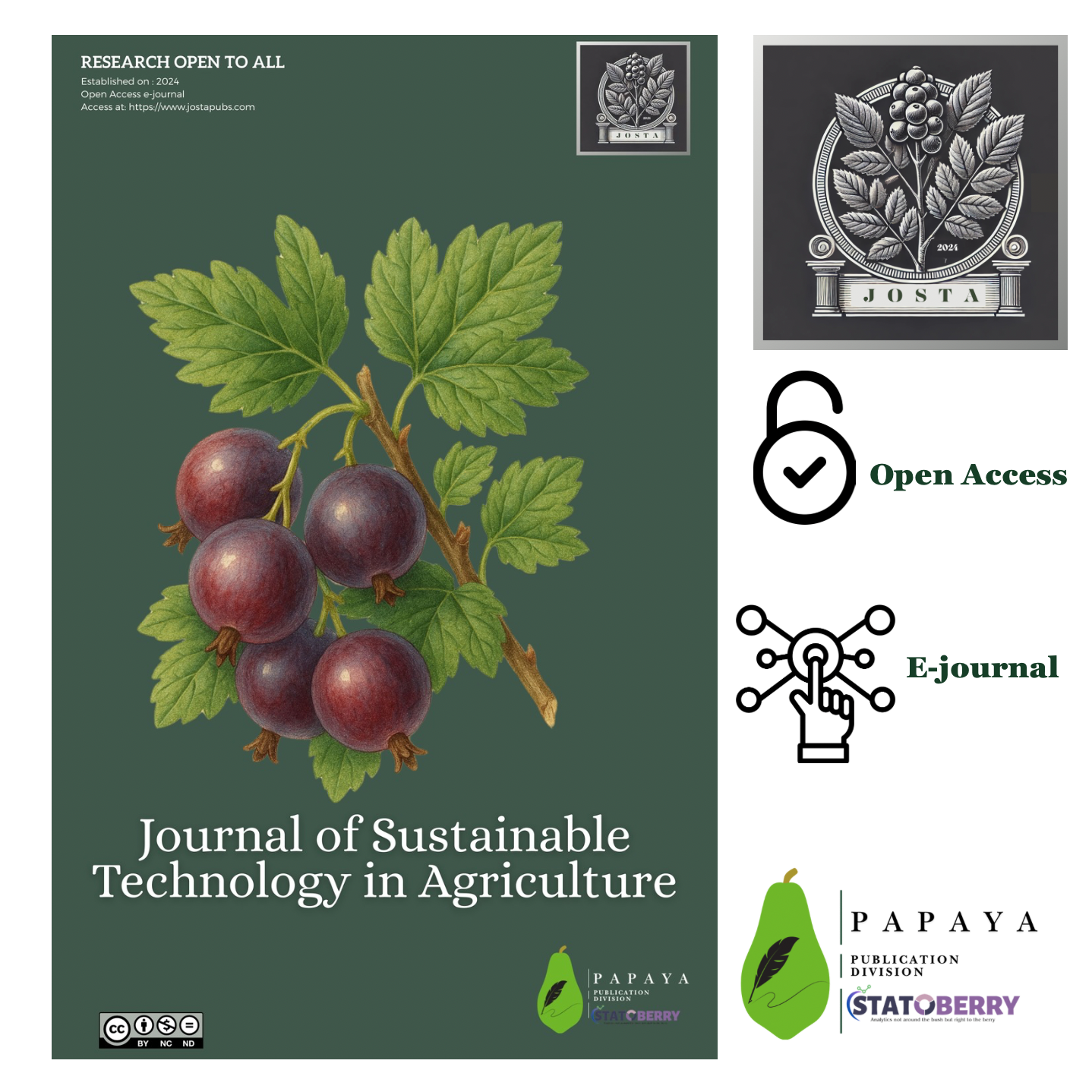Journal of Sustainable Technology in Agriculture
 indexed
indexed
 archived
archived
 Crossref DOI
CODEN: JSTACI
Crossref DOI
CODEN: JSTACI
 indexed
indexed
 preserved
Open Access
Peer-reviewed
preserved
Open Access
Peer-reviewed
 indexed
indexed
 archived
archived
 Crossref DOI
CODEN: JSTACI
Crossref DOI
CODEN: JSTACI
 indexed
indexed
 preserved
preserved
Recent articles



-
A Review on the Influence of Cultivation Practices on Wheat Production in India
- Review-Article
- Crops
- ClimateResilience
The cultivation of wheat in India, a staple crop vital to national food security, faces significant challenges due to changing climatic conditions and evolving agricultural practices. This review paper synthesizes recent research on the impact of planting practices on wheat cultivation in India, highlighting how these practices influence productivity, resource use efficiency and sustainability. Read more …
-
Phytochemistry and Medicinal Significance of Adhatoda vasica : A Review
- Review-Article
- Horticulture
- Medicinal-plants
Adhatoda vasica (syn. Justicia adhatoda L.), commonly known as Vasaka or Malabar nut, is a medicinal plant of considerable therapeutic importance in traditional systems such as Ayurveda and Unani. This review presents a comprehensive summary of its phytochemical constituents and pharmacological activities. Read more …
-
Modeling Plant Disease Epidemics: A Comprehensive Review of Disease Progress Curves
- Review-Article
- Statistics
- Pathology
Temporal analysis of disease progression provides deeper insights into epidemiological patterns by examining disease levels across multiple time points. Disease progress curves (DPCs) capture how disease severity changes over time and reflect the combined effects of host, pathogen, and environment during an epidemic. Read more …
-
The Future of Vertical Coordination in High Value Agricultural Markets: Insights from Structured Panel Discussion
- Original-Article
- panel-discussion
- Extension
- AgriBusiness
This study integrates perspectives from a structured panel discussion with industry experts and agritech entrepreneurs examining changing vertical coordination patterns in Kerala’s spice sector. Insights from two spice technology companies and an agritech startup Read more …
-
Dielectric barrier discharge cold plasma for managing red flour beetle, Tribolium castaneum (Herbst)
- Original-Article
- Pests
- PostHarvest
- Sustainable-Technology
The red flour beetle, Tribolium castaneum (Coleoptera: Tenebrionidae), is one of the major stored products pests, causing substantial economic losses globally. The increasing restrictions on chemical fumigants necessitate the development of eco-friendly alternatives.Read more …
-
Genetic Engineering for Drought Tolerance In Crop Plants: Advances and Strategies
- Review-Article
- Breeding
- Biotech
Drought stress represents one of the most critical abiotic factors limiting global crop productivity by disrupting physiological, biochemical, and molecular processes in plants. This review provides a comprehensive overview of advancements in genetic engineering strategies Read more …
-
Bibliometric Analysis on Livelihood Security Research: Trends, Patterns and Future Directions
- Review-Article
- Economics
- Policy
Livelihood security has become a central theme in development research, closely linked with food security, climate change, and sustainability. This study presents a bibliometric analysis of 514 Scopus-indexed articles published between 2014 and 2024 in economics, econometrics, and finance.Read more …
-
Functional Diversity of Microbial Communities in Nutrient Cycling and Soil Carbon Sequestration
- Review-Article
- Soil
- Microbiology
- Crops
- PlantScience
The living soil system is fundamental to sustainable agriculture, with soil quality reflecting environmental stability and food security. However, soil health is declining due to unsustainable practices and climatic stresses such as drought and salinity.Read more …
-
Semantic Variances in Career Expectations among Stakeholders in the Agricultural Sector: Opportunities and Challenges
- Original-Article
- Extension
- Sustainability
This study examines the semantic differences in career expectations among key stakeholders in the agricultural sector. Using a semantic differential scale, the research evaluates perceptions related to job opportunities, career progression, work-life balance, and job security. Read more …
-
Barriers to Agroecological Transition: Understanding Farmers Constraints in Meghalaya
- Original-Article
- Extension
- Sustainability
Agroecology provides a transformative pathway toward sustainable and resilient food systems by integrating ecological principles with local knowledge. This study, conducted in the Selsella Block of South West Garo Hills, Meghalaya Read more …
-
Best-Worst Scaling in Agricultural Research: A Review of Methods and Applications
- Review-Article
- Data-Science
- Statistics
Understanding stakeholder preferences is essential for designing effective agricultural policies, promoting technology adoption, and aligning market strategies with consumer demand. Best–Worst Scaling (BWS) is a robust stated preference method Read more …
-
Designs for Sensory Experiments and Product Optimisation: A Comprehensive Review
- Review-Article
- Statistics
- PostHarvest
- Food
Research in the fields of postharvest technology and food and nutrition are rapidly advancing with sensory experiments playing a major role in assessing consumer preference.Read more …
-
Reliability and Validity in Agricultural Research: A Shiny App for Non-statisticians
- Original-Article
- Data-Science
- Software
Survey research is essential for understanding attitudes, behaviours, and perceptions across diverse populations, providing the foundation for data-driven decisions and empirical analysis. Researchers often face difficulties in assessing the validity and reliability of survey instruments due to complex statistical procedures, limited access to integrated tools, and the need for multiple software platforms. Read more …
-
Dairy SHGs in Kerala: Economics and Loan Repayment Drivers
- Original-Article
- Economics
- Policy
Microfinance activities play a vital role among the poor to raise their microenterprises especially in the primary agricultural sector of rural India and helped the marginalized people to elude from poverty. This paper detailed the economic performance of dairy-based SHGs and discuss the factors that influence the repayment performance of the SHGs in Kerala. Read more …
-
Genetic Variability and Diversity Analysis in Sesame (Sesamum indicum L.)
- Original-Article
- Plant-Science
- Crops
- Genetics
Sesame (Sesamum indicum L.) is an ancient oilseed crop of significant nutritional and economic value, but its productivity remains suboptimal due to limited genetic improvement. This study assessed genetic variability, correlation patterns, and genetic divergence among 40 sesame genotypes to identify superior parents for breeding programs. Read more …
-
Biochar for Enhancing Yield, Nutrient Uptake, and Soil Fertility in Okra
- Original-Article
- Plant-Science
- Crops
- Agronomy
The beneficial role of biochar in improving soil fertility is well known, but the optimal application rate in sandy loam soils remains unclear. To address this gap, a field experiment was conducted in 2023 on the coastal sandy loam soils of Kayamkulam, Kerala, to assess the impact of different biochar rates on okra yield, nutrient uptake, and soil fertility. The study followed a randomized block design with nine treatments: various combinations of biochar (5 and 10 t ha\(^{-1}\)), farmyard manure (5 and 20 t ha\(^{-1}\)), and two nutrient levels (75% and 100% RDF). Results revealed that the application of biochar at 10 t ha\(^{-1}\) along with the recommended nutrient dose (110:35:70 kg N:P\(_2\)O\(_5\):K\(_2\)O ha\(^{-1}\)) significantly improved okra yield and nutrient uptake while enhancing soil fertility. The findings highlight the potential of biochar as a soil conditioner and underscore the importance of application rate for achieving optimal benefits.
-
Impact of COVID Lockdown on Price Volatility of Pineapple in Vazhakulam, Kerala
- Case-Study
- Economics
- Policy
Price fluctuations pose a major challenge in horticulture, especially for perishable crops like pineapple. Vazhakulam in Kerala is a leading hub for pineapple cultivation, with strong interstate marketing networks. This study investigates price volatility in the Vazhakulam pineapple market during covid lock down using daily price data from January 2017 to September 2022. Read more …
-
Digenic Interactions on Yield in Yardlong Bean: A Generation Mean Analysis
- Original-Article
- Plant-Science
- Crops
- Genetics
Vegetable cowpea [Vigna unguiculata ssp. sesquipedalis (L.) Verdc.] is a distinct form of cowpea cultivated in southern Asia and the Far East for its immature pods. Six parameter generation mean analysis of three cowpea crosses revealed complex gene action for several yield-related traits. Significant scale tests and epistasis indicated the inadequacy of the simple additive-dominance model, underscoring the role of non-allelic interactions in trait inheritance. Additive × additive, additive × dominance, and dominance × dominance effects were observed for traits such as pod length, pod yield per plant, pods per plant, and root weight. The presence of duplicate and complementary epistasis suggests that hybridization followed by selection in segregating generations would be effective for improving these traits. Traits like pod breadth, seeds per pod, and 100-seed weight, which lacked significant epistasis, can be improved using additive-dominance models. Recombination breeding is recommended for enhancing pod yield and pod weight.
-
RAISINS: Integrating R and AI for Agricultural Data Analysis
- Original-Article
- Data-Science
- Software
RAISINS (R and AI Solutions for INferential Statistics) is a web-based statistical analysis platform designed to bridge the gap between complex inferential methods and the practical needs of students and researchers, particularly in the agricultural sciences. By integrating the computational power of R and Python with the adaptive capabilities of OpenAI’s artificial intelligence APIs, RAISINS delivers an intuitive, code-free interface for performing advanced statistical analyses. Hosted on Posit Connect Cloud, the platform eliminates the need for local software installation, enabling seamless, browser-based access to a wide range of statistical tools. RAISINS simplifies model building, result interpretation, and reporting, making it especially valuable for non-statisticians and early-career researchers seeking reliable insights from agricultural data.
About the journal
The Journal of Sustainable Technology in Agriculture (JOSTA) is a peer-reviewed, open-access e-journal dedicated to publishing high-quality research that fosters innovation and sustainability in agriculture. Founded by a collaborative group of scientists and professionals, JOSTA serves as a reliable and inclusive platform for sharing advancements that enhance agricultural practices through responsible technology use, practical innovation, and applied research.
We are committed to academic integrity and scientific excellence. All manuscripts submitted to JOSTA undergo a rigorous peer-review process to ensure validity, relevance, and quality. Our open-access model ensures that published research is freely available to researchers, practitioners, educators, and policymakers around the world-promoting broad dissemination and knowledge sharing.
We are also a registered member of Crossref , the global scholarly infrastructure that connects research publications through persistent Digital Object Identifiers (DOIs). Every article published in JOSTA is assigned a unique Crossref DOI, ensuring permanent identification, reliable citation linking, and global discoverability across academic databases such as Google Scholar and OpenAIRE.
Article metadata and publication records are preserved in Zenodo, with all full-text PDFs permanently stored in the Internet Archive. Website pages are version-controlled through GitHub to ensure transparent version history and long-term preservation. JOSTA maintains a dedicated Zenodo community, providing secure, long-term archiving of published articles in CERN’s data centre for as long as CERN exists. Through OpenAIRE indexing, JOSTA’s publications are integrated into global research infrastructures, ensuring broad visibility, discoverability, and compliance with open-science mandates. For further information, see the Archiving & Digital Preservation page.
The journal encourages interdisciplinary contributions from agricultural sciences, engineering, social sciences, and environmental studies that align with its mission of promoting sustainable agricultural development.
JOSTA is managed by PAPAYA, Academic Press of Statoberry LLP and supported by domain experts in agriculture and allied sciences, ensuring both technical accuracy and contextual relevance in all published content. Technical support for JOSTA is provided by Department of Agricultural Statistics, College of Agriculture, Vellayani, Kerala Agricultural University, Kerala, India.
 All articles published are indexed in OpenAIRE as they are archived in Zenodo.
All articles published are indexed in OpenAIRE as they are archived in Zenodo.

Aim & scope
The Journal of Sustainable Technology in Agriculture (JOSTA) is committed to publishing high-quality, peer-reviewed research that advances scientific understanding, technological innovation, and sustainable development within the agricultural sciences. As a multidisciplinary platform positioned at the intersection of biological, environmental, technological, and socio-economic disciplines, JOSTA supports research that drives resilience, productivity, and sustainability in global food and farming systems. Modern agriculture requires integrated and innovative solutions, and JOSTA therefore welcomes submissions that bridge plant science, soil ecology, biotechnology, engineering, data science, economics, rural development, and knowledge management to address challenges in food security, climate resilience, ecological sustainability, and rural livelihoods.
The journal publishes contributions across a wide spectrum of thematic domains. In Crop and Plant Science, JOSTA welcomes research in crop improvement, physiology, stress biology, agronomy, horticultural innovations, plant health, entomology, disease management, pest dynamics, and integrated pest and disease management (IPDM). Within Soil Science and Agroecology, the journal features work on soil health, nutrient management, soil microbiology, land degradation, carbon dynamics, regenerative agriculture, restorative practices, and ecological approaches to sustainable farming systems.
Research in Animal Science and Fisheries includes livestock production, animal nutrition, health management, aquaculture systems, and breeding strategies that enhance productivity and sustainability. The Biotechnology & Molecular Biology section focuses on genetic engineering, genomics, molecular markers, transgenic technologies, tissue culture, and molecular approaches that advance agricultural innovation.
JOSTA also supports the rapidly growing domain of Agricultural Engineering and Technology, covering machinery innovations, irrigation systems, automation, sensors, robotics, precision agriculture, drones, and farm energy technologies. In Data Science and Statistics in Agriculture, the journal encourages submissions in statistical modelling, AI and machine learning, big-data analytics, remote sensing, GIS applications, computational biology, and evidence-based decision-support systems.
The journal places strong emphasis on socio-economic and policy dimensions. The Agricultural Economics and Policy section includes research on farm economics, market analysis, price policy, value-chain studies, resource economics, climate economics, agribusiness systems, and rural livelihood strategies. Complementing this, the Extension Education and Rural Development section includes studies on outreach methodologies, participatory learning, knowledge transfer, innovation ecosystems, rural sociology, capacity building, gender inclusion, youth engagement, and community-level resilience.
JOSTA also addresses the post-production spectrum through the Post-Harvest Technology and Food Science section, covering post-harvest handling, storage technologies, value addition, food processing, food safety, and quality evaluation. Research in Climate Change and Sustainable Agriculture includes climate adaptation and mitigation strategies, carbon farming, climate-smart agriculture, emission reduction approaches, and sustainability metrics. The Forestry and Agroforestry section highlights agroforestry systems, biodiversity conservation, forest management, ecological services, and tree-based livelihood models.
Recognizing the essential role of information systems in modern science, JOSTA includes a dedicated section on Library and Information Science, focusing on digital libraries, metadata standards, bibliometrics, open-access ecosystems, information literacy, and agricultural knowledge management.
Through rigorous double-anonymous peer review and a fully open-access publishing model, JOSTA ensures that research outputs remain freely accessible to the global community. The journal encourages interdisciplinary perspectives, methodological transparency, and collaborative innovation to support the sustainable transformation of agricultural systems and contribute to solving emerging environmental and developmental challenges.
Publication model
The JOSTA follows an online, Open-access, continuous publication model. Accepted articles are published immediately after final editorial processing to ensure rapid dissemination of research.
For organisational clarity, articles published throughout the year are grouped into four issues corresponding to:
- January – March
- April – June
- July – September
- October – December
This system ensures both timely publication and structured indexing of articles.
Journal metrics
Journal metrics
- Average time to first decision 10–15 days
- Average time to publication 30–35 days Fast track: 14 days
- Rejection rate 40%
- Articles per issue 10–12
- Issues per year (Quarterly) 4
- Citations (after indexing & first cycle) To be updated
Note: Metrics are provisional and will be refined as the journal grows and indexing data becomes available.
Peer review policy
All submissions undergo an initial assessment by the managing editors. Suitable manuscripts are then assigned to the appropriate section editors, who identify independent experts in the relevant field to serve as reviewers. JOSTA follows a double-blind peer review process, where both authors and reviewers remain anonymous to ensure fairness and objectivity. Based on the reviewers’ feedback, authors may be requested to revise their manuscripts.
For a detailed description of the review process, see Peer review process.
🔓Open access
JOSTA is a fully open-access journal. All articles are freely available online without subscription or payment barriers, ensuring maximum visibility and global accessibility. Read our open access statement below.
Open access statement
JOSTA is an open access journal. All content is freely available without charge to users or their institutions. Readers may read, download, copy, distribute, print, search, or link to the full texts, or use them for any lawful purpose, without seeking prior permission from the authors or the publisher.
This policy follows the BOAI definition of open access.
Article processing charges (APC)
At JOSTA, we uphold the principle that research quality should never be compromised by publication costs.
✅ No submission fees
✅ No charges for figures, tables, or page limits
✅ Online publication with permanent open-access availability
✅ No subscription fees
We are committed to supporting high-quality, impactful research and promoting affordable, accessible publishing for all. By removing financial barriers, we aim to encourage meaningful contributions to sustainable technology in agriculture. For more detailed description on APCs, see Article Processing Charges (APCs).
In the spirit of openness, JOSTA maintains complete transparency about its operational costs.
Our current running expenses include:
- Crossref membership
- Website hosting and domain maintenance
- Server and infrastructure costs for the submission and review portal
- Editorial, copy-editing, and technical support services
How we sustain this model
JOSTA is proudly supported by our online data analysis platform RAISINS and the revenue generated by Statoberry LLP.
This allows us to offer APC free publication and maintain high editorial standards as a service to the global research community.
🍃Greener publishing
As a digital-only journal, JOSTA embraces environmentally responsible publishing. By eliminating print processes, we reduce paper use, energy consumption, and carbon footprint-aligning our commitment to open access with a sustainable future for scholarly communication.
Copyright information
All articles published in the Journal of Sustainable Technology in Agriculture (JOSTA) remain the copyright of their respective authors and are distributed under the Creative Commons Attribution-NonCommercial-NoDerivatives 4.0 International License . This license applies to the full text of all published articles.
- Attribution – Appropriate credit must be given to the original authors and to JOSTA as the source of publication.
- Non-commercial – The material may not be used for commercial purposes.
- No derivatives – The material may not be remixed, transformed, or built upon without explicit permission.
© 2025 PAPAYA Academic Press, Statoberry LLP. All rights reserved for the JOSTA website design, layout, and journal branding.
For commercial reuse, translation, or distribution of printed copies of the journal’s formatted versions, prior written permission from PAPAYA Academic Press is required. These restrictions do not apply to the article content itself, which remains available under the terms of the CC BY-NC-ND 4.0 license .
Also read the full Copyright & Licensing Policy: here



